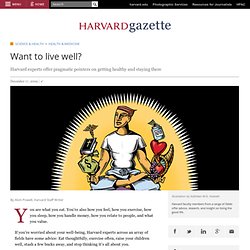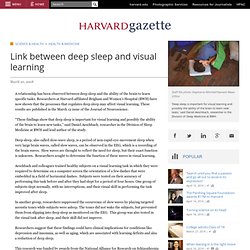

Sleep after learning strengthens connections between brain cells and enhances memory. In study published today in Science, researchers at NYU Langone Medical Center show for the first time that sleep after learning encourages the growth of dendritic spines, the tiny protrusions from brain cells that connect to other brain cells and facilitate the passage of information across synapses, the junctions at which brain cells meet.

Moreover, the activity of brain cells during deep sleep, or slow-wave sleep, after learning is critical for such growth. The findings, in mice, provide important physical evidence in support of the hypothesis that sleep helps consolidate and strengthen new memories, and show for the first time how learning and sleep cause physical changes in the motor cortex, a brain region responsible for voluntary movements.
"We've known for a long time that sleep plays an important role in learning and memory. To shed light on this process, Dr. Gan and colleagues employed mice genetically engineered to express a fluorescent protein in neurons. Relationship of endogenous circadian melatoni... [J Investig Med. 1999. Want to live well? You are what you eat.

You’re also how you feel, how you exercise, how you sleep, how you handle money, how you relate to people, and what you value. If you’re worried about your well-being, Harvard experts across an array of fields have some advice: Eat thoughtfully, exercise often, raise your children well, stash a few bucks away, and stop thinking it’s all about you. People make choices every day that affect their health and happiness, but life’s complexity and its bewildering array of options — not to mention the species-wide lack of willpower — can make living well a challenge. Vast research conducted across Harvard’s myriad Schools and programs continues to help push back the boundaries of understanding about human health and behavior, enhancing the knowledge of what makes people ill and what makes them well, what makes them wilt and what makes them prosper. Eating healthy includes watching quality and quantity, Willett said. 1. 2. 3. Norton and Weissbourd may be onto something.
Sleep, Learning, and Memory. The Relationship Between Sleep, Insomnia, and Creativity. The relationship between sleeping and creativity is the subject of much folklore and even admonitions to problem-solving such as advice to "sleep on it" when faced with a tough decision.

Artists have long pointed to sleep and related bodily phenomena as a source and parallel to their creative pursuits. Creators often talk of inspiration coming during a waking period similar to a dream and daydreams have long been connected with new ideas or syntheses of existing idea or applying existing ideas in new ways. Sleep brings a different approach. Samuel Taylor Coleridge allegedly wrote the poem Kubla Khan after waking from an opium-induced dream, although some doubt this claim.
Coleridge related the story years after he wrote the poem. Link between deep sleep and visual learning. Staff file photo Stephanie Mitchell/Harvard News Office ‘Deep sleep is important for visual learning and possibly the ability of the brain to learn new tasks,’ said Daniel Aeschbach, researcher in the Division of Sleep Medicine at BWH.

A relationship has been observed between deep sleep and the ability of the brain to learn specific tasks. Researchers at Harvard-affiliated Brigham and Women’s Hospital (BWH) have now shown that the processes that regulates deep sleep may affect visual learning. These results are published in the March 12 issue of the Journal of Neuroscience.
“These findings show that deep sleep is important for visual learning and possibly the ability of the brain to learn new tasks,” said Daniel Aeschbach, researcher in the Division of Sleep Medicine at BWH and lead author of the study. The Surprising Relationship Between Sleep and Learning. Before you start your next Udemy course, it’s best you get a good nights rest.

Here is why: Meet Ed. He prides off thinking he only needs five hours of sleep a night. He claims to get more done after everyone else is asleep. What he doesn’t realize is that in the first few waking hours of the day Ed’s cognitive function already starts to dissipate. Study Shows How Sleep Improves Memory. BOSTON -- A good night's sleep triggers changes in the brain that help to improve memory, according to a new study led by researchers at Beth Israel Deaconess Medical Center (BIDMC).

These findings, reported in the June 30, 2005, issue of the journal Neuroscience and currently published on-line, might help to explain why children -- infants, in particular -- require much more sleep than adults, and also suggest a role for sleep in the rehabilitation of stroke patients and other individuals who have suffered brain injuries. "Our previous studies demonstrated that a period of sleep could help people improve their performance of 'memory tasks,' such as playing piano scales," explains the study's lead author Matthew Walker, PhD, director of BIDMC's Sleep and Neuroimaging Laboratory.